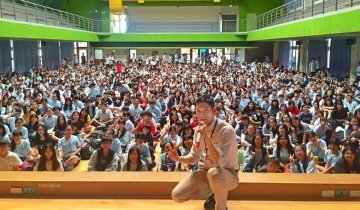In 2012, two financially beleaguered school districts in south Los Angeles County were on the brink of entering receivership. As it turned out, one did, and the other didn’t. In the Compton Unified School District, newly hired Superintendent Darin Brawley EdD ’17 rose to the crisis. “We developed a fiscal stabilization plan and implemented cuts,” he recalls. Compton Unified remained independent.
“Our students’ futures should not be limited by ZIP code or skin color,” says Brawley, the newest member of the USC Rossier Board of Councilors. From the beginning, he set out to close the opportunity gap for Black and Brown students in a district where 100% of enrolled students are from minoritized backgrounds and 92% are economically disadvantaged.
Brawley led the district’s dramatic turnaround, achieving financial stability and launching a student-centric, data-informed culture of learning. When he took the lead at Compton Unified, the graduation rate lagged at 58%. Today, it is 93%. Back then, only 14% of students met the requirements for entrance to the University of California and California State University systems. Now, 68% meet the A-G requirements for admission.
While in the process of transforming his district, Brawley enrolled in USC Rossier School of Education’s Doctor of Education in Educational Leadership program, receiving his EdD in 2017. His dissertation explored the significant impact of multinational corporations on STEM learning in Ireland. Drawing on his research, Brawley developed robust multilevel partnerships with corporations such as Verizon and RTX (formerly Raytheon Technologies Corp.). Every high school and middle school in the district is now a Verizon Innovative Learning School, providing technology for the classroom and comprehensive training for teachers. “Opportunities for students are of your wildest imagination,” Brawley says.
With careers of the future in mind, Brawley initiated a districtwide focus on STEAM (science, technology, engineering, arts and math) education. Students learn to code in preschool. “At every grade level, we’re offering technology, coding, robotics, drones and computational thinking, preparing our students for the digital economy,” he says.
Early in his tenure, he instituted SMART goals—or goals that are specific, measurable, attainable, relevant and timebound— that he credits as a key tool for districtwide success. Data gathered for the SMART process reflects State of California indicators such as student performance or absenteeism. Based on these categories, principals develop annual objectives for their schools. Throughout the year, working with the superintendent, they analyze the data to identify areas that require improvement.
Data collected over the past 12 years charts measurable and continual progress in technology, English language arts, math and English learning. “Our English language-learner population are amongst the best in the state in terms of academic achievement,” notes Brawley.
He recalls, “There was a time when Black students had a significant achievement gap compared to others. Now, for the last couple of years, they’re graduating at the highest percentage rate of all our students.” Compton Unified’s high-performing Early College High School is rated No. 32 in the state of California, and 273 nationally. This year, 126 students graduated with the equivalent of an associate of arts degree.
Students who were kindergartners when Brawley took charge of the once-failing district are now attending colleges and universities, including USC. In his commencement address, Brawley noted how the Class of 2024 was special to him and assured the graduates that they were prepared for whatever they chose to do next.
The superintendent wants people to know that “students are thriving here. This is not your Compton of 30 years ago. Drop the narratives about gangster rap or professional athletes and start paying attention to student achievement.”
Asked if other districts can replicate Compton Unified’s success, he replied, “Educators need to understand that students, not the adults, come first. The core mission of why we exist is to deliver outcomes for our students.”




